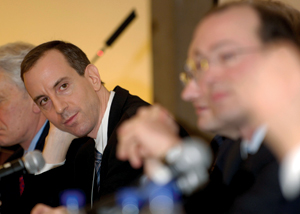|
||
      |
Experts debate looting laws
McGuire Gibson, AM’64, PhD’68, tried hard before the Iraq war to impress upon the Pentagon the importance of protecting Iraq’s cultural treasures. Despite officials’ pre-invasion assurances, the U.S. failed to guard several dig sites and the Iraqi National Museum. In April 2003 looters ransacked the museum. A month later Gibson, professor of Near Eastern languages & civilizations and president of the American Academic Research Institute in Iraq, took a helicopter tour and, he says, saw 250–300 looters digging up archaeological mounds.

Eric Posner offered an outsider’s view on antiquities looting.
At a February 3 conference, Protecting Cultural Heritage: International Law After the War in Iraq, Gibson showed slides of ancient cylinder seals, 5,000 of which had gone missing, one-third since recovered; ravaged museum offices; and desert sites that displayed the chaotic pocks of pillagers instead of the straight, properly dug lines archaeologists make. “The looting was completely predictable,” he said. Museum workers “had prepared for it, put stuff in storage. They thought it would be safeguarded by American troops. So did I.”
If preparation couldn’t save historically significant items from the black market, what could? At the conference, organized by by the U of C Cultural Policy Center and cosponsored by the Law School and the OI, international experts came together to consider the issue.
Most of the talk focused on the 1954 Hague Convention, an international agreement meant to protect culturally significant property during both war and peacetime, and whether it had failed to protect Iraqi antiquities. It did not fail, argued Guido Carducci, chief of the International Standards Unit of UNESCO’s Cultural Heritage Division. “A treatise is binding only upon state parties that consent,” Carducci pointed out. While Iraq is a member of the 1954 Hague Convention, the United States and Britain are not. More countries, he said, must accept the treaty.
The United States has signed, though never ratified, the agreement, noted DePaul University law professor Patty Gerstenblith. A member of an earlier, 1907 Hague Convention, the U.S. “claims to follow the rules of international customary law.” Yet simply stating a nation follows such principles, Gerstenblith said, “leaves a lack of clarity. If the United States is not bound by a principle, then it can’t be viewed as violating it.” The U.S. “soon will be the only major military power,” she said, not to have ratified it.
Matthew Bogdanos, author of Thieves of Baghdad: One Marine’s Passion for Ancient Civilizations and the Journey to Recover the World’s Greatest Stolen Treasures (Bloomsbury, 2005), eschewed the podium and the troubled sound system. Instead the Marine Reserves colonel paraded between aisles and gave a passionate appeal. Since April 2003 he has “spent every waking moment,” he said, “tracking down both terrorists and smugglers.” Smugglers, he said, “don’t care what’s in the box”—weapons, drugs, antiquities. “They get paid by the box.” Antiquities end up on the black market, and the looters’ payment, he argued, can end up funding terrorism. “The Taliban uses opium; in Iraq they use antiquities.”
Bogdanos is fighting international ambivalence. “I have asked many countries to increase inspectors at ports,” he said, “and been told that would raise customs fees.” A public-education campaign would help, as would better law enforcement.
The real problem, said Law School professor Eric Posner, offering an outsider’s view, isn’t that the treaty is vague or that too few countries have ratified it: “Even the states that are parties,” he said, “don’t pay much attention.” The lack of an international-enforcement mechanism also isn’t the hitch: “Most international organizations are weak for a reason. States don’t want to give international organizations much power.”
The hurdle, Posner said, is more basic: governments give cultural heritage low priority. “They care a little bit,” he said, but not as much as for arms control or the drug trade. The United States needed to provide law and order in Iraq. While preventing street crimes, murders, and protecting oil reserves, the military “had its hands full” and couldn’t also save the Iraqi museum.
“I’m puzzled by the view that cultural property should be given special status,” Posner added. All property theft, he argued, is included in the responsibility to maintain law and order. One solution, he offered, would be to change antiquities’ trade laws. “The black market exists only because it’s illegal to trade,” he said. “What we have here is a new drug war. If the market were freed up,” there would be more exporting and less looting.